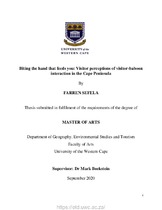Biting the hand that feeds you: Visitor perceptions of visitor-baboon interaction in the Cape Peninsula
Abstract
The rapid increase in urbanisation and tourism in the Cape Peninsula has increased the rate of human-wildlife interaction. The Cape Peninsula is unique in terms of placing urban areas next to protected natural areas with no physical barriers, thus allowing animals, especially baboons, to travel between the two areas, occasionally leading to conflict between humans and wildlife. Visitors to popular tourist sites may also actively participate in feeding baboons or through negligence by leaving food items in the open. As a result, changing the habits of the baboons as human food and food waste are seen as the preferred option in terms of dietary habits. The main aim of this study was to investigate the perceptions and social construction of visitors in the Cape Peninsula towards baboons at tourist sites. Social constructionist theory was used as the theoretical framework for the study, which looks at the way people perceive nature and wildlife, which is unique to each person. The study uses an exploratory sequential mixed methods design, with a qualitative section that includes three semi-structured interviews, followed by a quantitative section consisting of a questionnaire survey, with 201 questionnaires being completed. The survey was conducted at key tourist sites around the Cape Peninsula that are well known for baboon sightings, including Bordjiesrif Picnic Site, Buffels Bay viewpoint, Cape of Good Hope/Cape Point and Dias Beach. The study used discourse analyses and the Statistical Package for the Social Sciences (SPSS) to analyse the data, which allowed for ideas to be labelled and linked to opinions in the literature, and patterns identified during the data collection. Visitors viewed tourism spaces as anthropocentric areas, and thus perceived baboon-visitor interactions through conditional acceptance. Visitor perceptions and social construction of baboon-visitor interactions may be positive when conditional acceptance is adhered to, and negative when conditional acceptance is broken. Recommendations for further research includes more research on non-consumptive tourism activities and its impact on human-wildlife interactions, with a need for more literature on the influence of education on people’s attitudes towards wildlife, and finally, more research that focuses on the changing behavioural ecology of baboons, due to an increase in tourism/visitation.

